"It's okay to not be okay." Natalie van den Adel speaks on mental health
On August 5, Dutch 3x3 star Natalie van den Adel put out a statement addressing her stance on mental health, basketball and why she had decided to step back for a short while from the game.
“I needed to take a break because I just knew if I keep going like this, by this time it's December, it would be too much. I am already past my line and knowing I have another season ahead, it was just scary to think of what will happen if I don’t step back for a short while.”
On August 5, Dutch 3x3 star Natalie van den Adel put out a statement addressing her stance on mental health, basketball and why she had decided to step back for a short while from the game prior to the start of her 5 on 5 season. She had been involved in 3x3 since 2018 and has been instrumental in the team’s success in that time. She competed most recently in the FIBA 3x3 World Cup 2023 as well as the Women’s Series.
View this post on Instagram
Her words were heartfelt and incredibly brave, not only because of how difficult it could be to be vulnerable about yourself, but also because for her, basketball was all she had known.
“I got into basketball because of my parents. My whole family basically plays basketball. When I was a baby, I was already in the gym with them,” she said.
“When I was young, I was always very quiet, a little insecure. But the one thing I knew that I could do was play basketball. I was very secure about myself in a way that I knew that when I stepped on the court, I was very good at basketball. But it set me apart from everyone else because basketball is a very small sport. Not a lot of girls, especially back then, had the mindset of wanting to go pro. I was always the odd one out because I really wanted to play basketball.”
Her talent and passion took her to Colorado State University in the United States of America at the age of 17, a massive shift as compared to life in the Netherlands.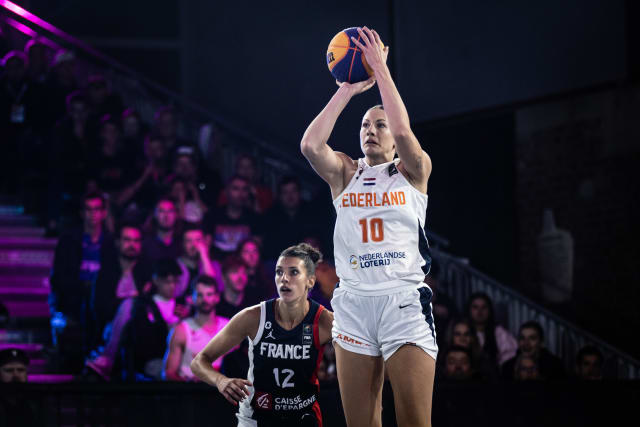
“It was a whole new world. I'd never experienced anything like it in my life. In the Netherlands, I practiced four or five times a week, but it was always after school and parents driving you up and down. In Colorado, all these facilities were there. You have trainers, you have a whole training room, you have five courts to practice on. It became really professional really quickly,” she said.
“It was always my dream to go there. I think my mom said I didn't even look back at the airport. But once you get there, you're all alone, you really have to fend for yourself. Training was so different too. I started lifting there. I had never lifted in my life and all of a sudden you're maxing out every other day. So I gained weight, I gained muscle.”
Natalie had to cope with not only the increasing pressures of fitting into a new system and country while excelling in the sport you hope to be your profession, but also with the changes in her physique that were constantly discussed in her sphere.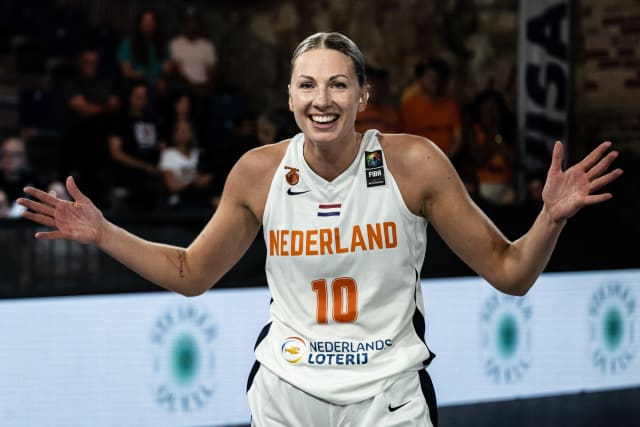
“It really started when the meetings I had with my coaches, it always was going back to them saying that it might be better if I lost some weight. It was always some comment here and there. I then went back to Europe and my friends who saw me leave when I was 17 and very skinny and now all of a sudden I have muscle and weight and the comments continued there as well,” she said.
“I started to become very aware of and critical of myself. I started thinking maybe I am fat, maybe I need to lose weight. I started being really obsessive with food. I felt guilty whenever I had dessert. It just became this constant thing in my head where I needed to be very careful about my weight and it was just tiring.”
She continued, “I think it all really had to do with low self-esteem. At some point I really didn't love myself. I really struggled with self-image problems. Everything else I was doing, I was always looking at myself a certain way. That affects you not only with basketball, with everything you do in life.”
Natalie’s struggles highlighted a story many athletes are familiar with. The journey is stressful and endless, having to be locked in 24/7. You invest so much of yourself into your sport that it eventually becomes a part of your identity.
She said, “We put a lot of value to how they perform. You feel good about yourself when you do really well. I used to be a perfectionist, super competitive, but I also know that it's okay to mess up every once in a while. Back then, I was really hard on myself because the moment I did good, that's when I felt good because that’s when I told myself I'm good enough now.”
She continued, “That’s really where I put my value in myself. I'm doing well, so I'm good enough. And the moment you don't do well is when you start thinking less of yourself. It was something I could control in some way because the harder you work, the better you're going to do.”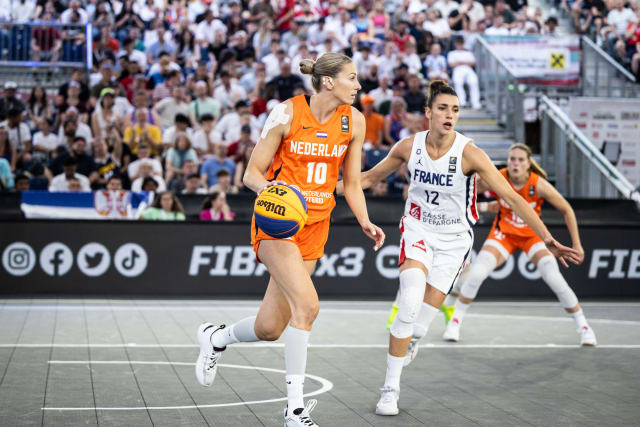
It had been years since the journey of becoming a professional athlete began for van den Adel. In that time, she had heard and seen it all while never really taking time to focus on her mental health.
“When COVID hit and everything shut down, that's when I really was able to take care of myself. I had a really rough time the year before, I've had a therapist for years and I really started just to look at myself and start recognizing certain thoughts I had in my head. I started talking to my therapist every two weeks over zoom. This was when I really worked on that part of myself. It was all about being kinder to myself and thinking it’s okay to mess up every once in a while and you're still the same person you are,” she said.
“There was a time when everything was always about basketball. Now I really try to make sure that I have some downtime where I don't have that pressure. I have a partner, I talk to my family, I try to go home and really disconnect because otherwise you just always have that pressure to be that player. And I feel like it's very important for any athlete to kind of have some downtime and disconnect.”
Van den Adel ⏩ behind the back to Boonstra
— FIBA3x3 (@FIBA3x3) July 14, 2023
Boonstra ⏩ back to Van den Adel for the finish 🥵 #3x3WS | #3x3WSPristina pic.twitter.com/92qCgVipDl
The statement put out by Natalie was decades in the making, a public disclaimer that being an athlete comes with a constant sense of pursuit all while you’re seen as being invincible. However, despite mental health becoming a topic spoken about in a more positive light, it unfortunately still is seen in a prejudiced light.
“I honestly hadn't planned on posting anything because I have been on some time off and I knew that come Summer, I'm going back to Spain. So I need to try to manage time off. I was really tired because prior to this, from summer 2021 until this summer, I have only had two weeks off, so I knew I was tired and I knew I needed to kind of manage this and at some point I just couldn't go anymore. I can't keep going like this. I need this time off knowing that I have another season coming up. I told my coaches a couple weeks back and they were really understanding.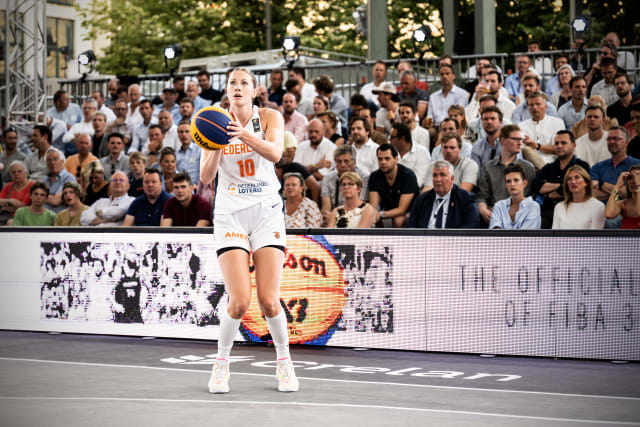
“I think what triggered it was, the conversation around mental health being so different from those around physical health. Say you sprain your ankle or you tear a ligament, there is a physio, there is treatment. There are resources provided to aid that. When it comes to mental health, suddenly the topic becomes funding. Your mental health is as important as another injury, because if you can't give your 100%, you cause the team to suffer.”
She added, “I was writing down my feelings just for myself, like if I would explain to someone else, this is what I would say because if I have this right now, there might be other athletes that have the same thing, but they're scared to speak out because all of a sudden you may be seen as a liability and it might cost you. If one person can find peace in knowing that it's okay not to be okay, it's okay to go talk to someone or take a break, then the statement was worth it.”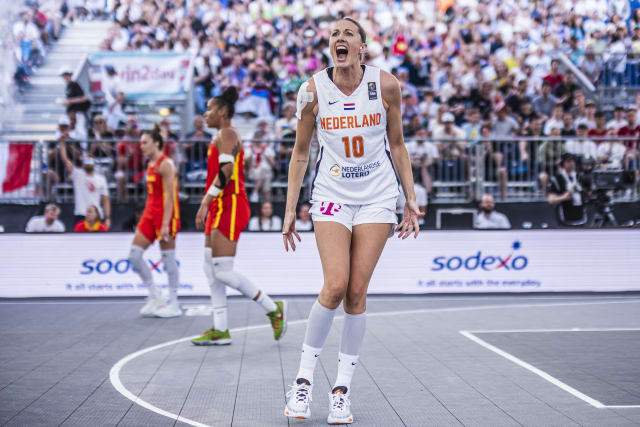
Her words have led to discussions within the 3x3 world regarding mental health and prioritizing yourself. She said, “It's okay to acknowledge that you’re struggling and to own the truth of what you’re going through. I really hope that it sparks the conversation that mental health is a real thing and it should be normalized. People are thankfully talking about it more now, but I still think there's a certain taboo around it. Hopefully more conversations about it can change the current perception around mental health.”
The 3x3 world has come out in support for van den Adel and her message serves as a reminder that athletes will always be more than just the sport they represent.
Hear more on the 3x3 Basketball Podcast below: